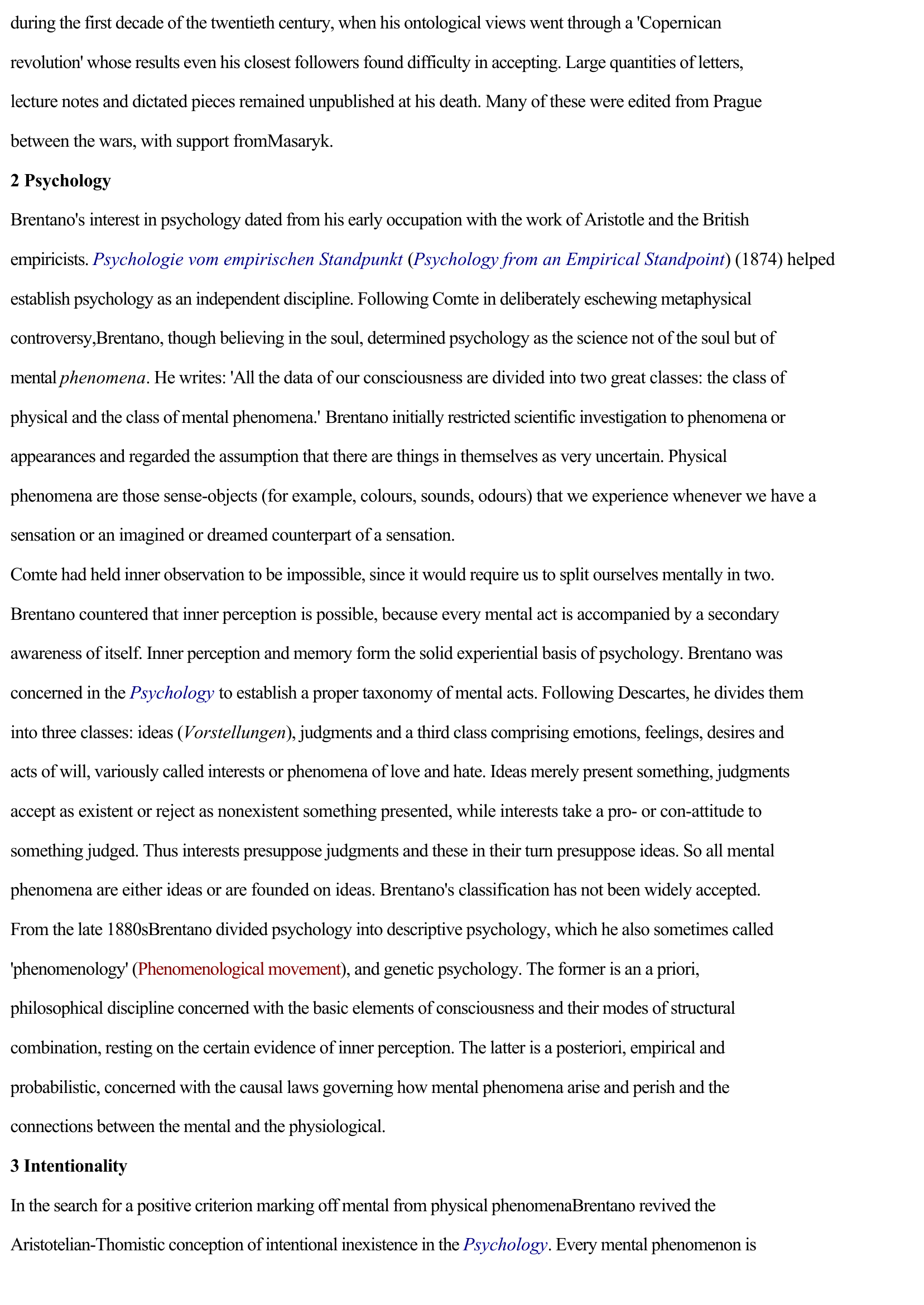Brentano, Franz Clemens
Publié le 22/02/2012

Extrait du document
«
during the first decade of the twentieth century, when his ontological views went through a 'Copernican
revolution' whose results even his closest followers found difficulty in accepting.
Large quantities of letters,
lecture notes and dictated pieces remained unpublished at his death.
Many of these were edited from Prague
between the wars, with support fromMasaryk.
2 Psychology
Brentano's interest in psychology dated from his early occupation with the work of Aristotle and the British
empiricists.
Psychologie vom empirischen Standpunkt (Psychology from an Empirical Standpoint ) (1874) helped
establish psychology as an independent discipline.
Following Comte in deliberately eschewing metaphysical
controversy,Brentano, though believing in the soul, determined psychology as the science not of the soul but of
mental phenomena .
He writes: 'All the data of our consciousness are divided into two great classes: the class of
physical and the class of mental phenomena. ' Brentano initially restricted scientific investigation to phenomena or
appearances and regarded the assumption that there are things in themselves as very uncertain.
Physical
phenomena are those sense-objects (for example, colours, sounds, odours) that we experience whenever we have a
sensation or an imagined or dreamed counterpart of a sensation.
Comte had held inner observation to be impossible, since it would require us to split ourselves mentally in two.
Brentano countered that inner perception is possible, because every mental act is accompanied by a secondary
awareness of itself.
Inner perception and memory form the solid experiential basis of psychology.
Brentano was
concerned in the Psychology to establish a proper taxonomy of mental acts.
Following Descartes, he divides them
into three classes: ideas ( Vorstellungen ), judgments and a third class comprising emotions, feelings, desires and
acts of will, variously called interests or phenomena of love and hate.
Ideas merely present something, judgments
accept as existent or reject as nonexistent something presented, while interests take a pro- or con-attitude to
something judged.
Thus interests presuppose judgments and these in their turn presuppose ideas.
So all mental
phenomena are either ideas or are founded on ideas.
Brentano's classification has not been widely accepted.
From the late 1880sBrentano divided psychology into descriptive psychology, which he also sometimes called
'phenomenology' (Phenomenological movement ), and genetic psychology.
The former is an a priori,
philosophical discipline concerned with the basic elements of consciousness and their modes of structural
combination, resting on the certain evidence of inner perception.
The latter is a posteriori, empirical and
probabilistic, concerned with the causal laws governing how mental phenomena arise and perish and the
connections between the mental and the physiological.
3 Intentionality
In the search for a positive criterion marking off mental from physical phenomenaBrentano revived the
Aristotelian-Thomistic conception of intentional inexistence in the Psychology .
Every mental phenomenon is.
»
↓↓↓ APERÇU DU DOCUMENT ↓↓↓
Liens utiles
- HISTOIRE DU BRAVE GASPARD ET DE LA BELLE ANNETTE (résumé) Clemens Brentano
- PSYCHOLOGIE DU POINT DE VUE EMPIRIQUE Franz Brentano (résumé & analyse)
- PONGE DE LÉON Clemens Brentano (analyse de l'oeuvre) - (Fiche de lecture)
- Achim von Arnim und Clemens Brentano: Des Knaben Wunderhorn (Sprache & Litteratur).
- Clemens Brentano (Sprache & Litteratur).

































